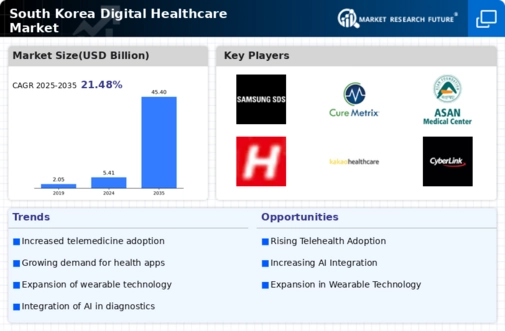Government Initiatives and Support
Government initiatives play a crucial role in shaping the digital healthcare market. In South Korea, the government has implemented various policies aimed at promoting digital health technologies. For instance, the Ministry of Health and Welfare has launched programs to support telemedicine and digital health startups, which are expected to enhance accessibility and affordability of healthcare services. The government's investment in digital infrastructure is also noteworthy, with funding exceeding $200 million allocated for health IT projects. These initiatives not only foster innovation but also encourage collaboration between public and private sectors, thereby driving the growth of the digital healthcare market. As a result, the market is likely to witness increased participation from various stakeholders, including technology firms and healthcare providers.
Technological Advancements in Healthcare
The digital healthcare market is experiencing rapid growth due to technological advancements in healthcare delivery systems. Innovations such as telehealth platforms, wearable devices, and remote monitoring tools are transforming patient care. In South Korea, the integration of advanced technologies is projected to increase the market size significantly, with estimates suggesting a growth rate of approximately 15% annually. This surge is driven by the increasing demand for efficient healthcare solutions that enhance patient engagement and streamline operations. Furthermore, the adoption of electronic health records (EHR) and health information exchanges (HIE) is facilitating better data management and interoperability among healthcare providers. As a result, the digital healthcare market is likely to expand, offering new opportunities for stakeholders and improving overall healthcare outcomes.
Rising Demand for Personalized Healthcare
The digital healthcare market is witnessing a rising demand for personalized healthcare solutions. Patients are increasingly seeking tailored treatment plans that cater to their individual needs, which is driving the adoption of digital health technologies. In South Korea, the market for personalized medicine is expected to grow at a rate of 12% annually, reflecting a shift towards more patient-centric care. This trend is facilitated by advancements in data analytics and artificial intelligence, which enable healthcare providers to offer customized services based on patient data. Consequently, the digital healthcare market is evolving to meet these demands, leading to improved patient satisfaction and outcomes. The emphasis on personalized healthcare is likely to attract investments and innovations, further propelling the market forward.
Aging Population and Chronic Disease Management
The aging population in South Korea is a significant driver of the digital healthcare market. As the demographic landscape shifts, there is an increasing prevalence of chronic diseases, necessitating effective management solutions. The digital healthcare market is poised to address these challenges by offering remote monitoring and telehealth services that cater to the needs of elderly patients. Reports indicate that approximately 30% of the population will be over 65 years by 2030, highlighting the urgent need for innovative healthcare solutions. Digital health technologies can facilitate better management of chronic conditions, reduce hospital visits, and enhance the quality of life for older adults. This demographic trend is likely to stimulate growth in the digital healthcare market, as stakeholders seek to develop targeted solutions for this population.
Increased Health Awareness and Consumer Engagement
Increased health awareness among consumers is driving the digital healthcare market in South Korea. As individuals become more informed about health issues, there is a growing demand for digital health solutions that empower them to take control of their health. The proliferation of mobile health applications and online health resources is indicative of this trend, with usage rates soaring by over 40% in recent years. Consumers are actively seeking tools that provide health information, track fitness, and manage chronic conditions. This heightened engagement is prompting healthcare providers to adopt digital solutions that enhance patient interaction and education. Consequently, the digital healthcare market is likely to expand as more consumers embrace technology to improve their health outcomes.




















Leave a Comment